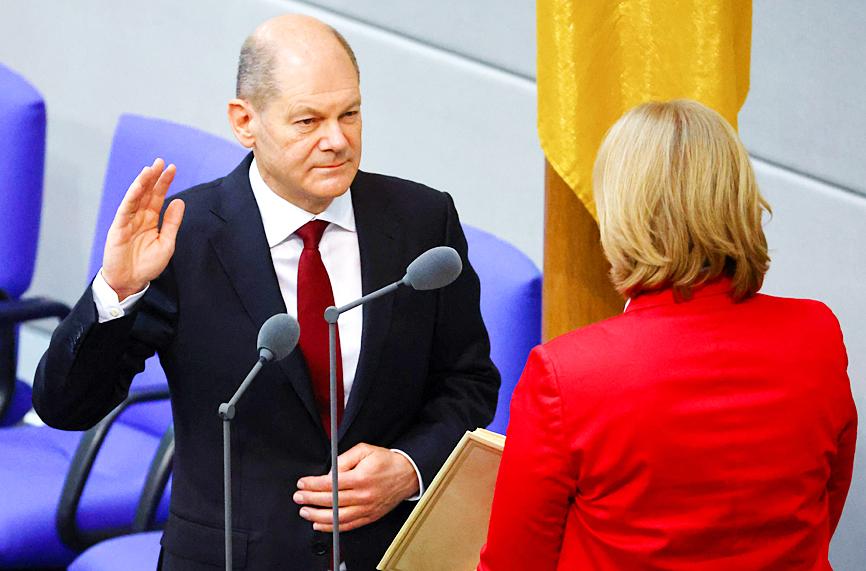Olaf Scholz yesterday became Germany’s ninth post-World War II chancellor, opening a new era for the EU’s most populous nation and largest economy after Angela Merkel’s 16-year tenure.
Scholz’s government takes office with high hopes of modernizing Germany and combating climate change, but faces the immediate challenge of handling the country’s toughest phase yet of the COVID-19 pandemic.
Lawmakers voted 395-303 to elect Scholz, with six abstentions — a comfortable majority, although short of the 416 seats his three-party coalition holds in the 736-seat lower house of parliament.

Photo: Reuters
That is not unusual when chancellors are elected and some lawmakers were out sick.
Scholz exchanged fist bumps with lawmakers from across the political spectrum before German President Frank-Walter Steinmeier formally appointed him as chancellor.
He was sworn in by German Parliament President Barbel Bas later yesterday.
Merkel, who is no longer a member of parliament, looked on from the spectators’ gallery as parliament voted.
Lawmakers gave her a standing ovation as the session started.
World leaders from Russian President Vladimir Putin to French President Emmanuel Macron and European Commission President Ursula von der Leyen extended their congratulations to Scholz.
Putin wants “constructive ties” with Scholz and hopes for continuity in relations between the two countries, the Kremlin said.
“We are counting on continuity, on the fact that constructive relations will develop between the president and the new chancellor, that the German side will continue to proceed from the understanding that there is no alternative to dialogue to resolve the most difficult differences,” Kremlin spokesman Dmitry Peskov told reporters.
Scholz, 63, leads a coalition of his Social Democratic Party, the Greens and the Free Democratic Party.
“We are venturing a new departure, one that takes up the major challenges of this decade and well beyond that,” Scholz said on Tuesday.

DEFENDING DEMOCRACY: Taiwan shares the same values as those that fought in WWII, and nations must unite to halt the expansion of a new authoritarian bloc, Lai said The government yesterday held a commemoration ceremony for Victory in Europe (V-E) Day, joining the rest of the world for the first time to mark the anniversary of the end of World War II in Europe. Taiwan honoring V-E Day signifies “our growing connections with the international community,” President William Lai (賴清德) said at a reception in Taipei on the 80th anniversary of V-E Day. One of the major lessons of World War II is that “authoritarianism and aggression lead only to slaughter, tragedy and greater inequality,” Lai said. Even more importantly, the war also taught people that “those who cherish peace cannot

STEADFAST FRIEND: The bills encourage increased Taiwan-US engagement and address China’s distortion of UN Resolution 2758 to isolate Taiwan internationally The Presidential Office yesterday thanked the US House of Representatives for unanimously passing two Taiwan-related bills highlighting its solid support for Taiwan’s democracy and global participation, and for deepening bilateral relations. One of the bills, the Taiwan Assurance Implementation Act, requires the US Department of State to periodically review its guidelines for engagement with Taiwan, and report to the US Congress on the guidelines and plans to lift self-imposed limitations on US-Taiwan engagement. The other bill is the Taiwan International Solidarity Act, which clarifies that UN Resolution 2758 does not address the issue of the representation of Taiwan or its people in

US Indo-Pacific Commander Admiral Samuel Paparo on Friday expressed concern over the rate at which China is diversifying its military exercises, the Financial Times (FT) reported on Saturday. “The rates of change on the depth and breadth of their exercises is the one non-linear effect that I’ve seen in the last year that wakes me up at night or keeps me up at night,” Paparo was quoted by FT as saying while attending the annual Sedona Forum at the McCain Institute in Arizona. Paparo also expressed concern over the speed with which China was expanding its military. While the US

‘FALLACY’: Xi’s assertions that Taiwan was given to the PRC after WWII confused right and wrong, and were contrary to the facts, the Ministry of Foreign Affairs said The Ministry of Foreign Affairs yesterday called Chinese President Xi Jinping’s (習近平) claim that China historically has sovereignty over Taiwan “deceptive” and “contrary to the facts.” In an article published on Wednesday in the Russian state-run Rossiyskaya Gazeta, Xi said that this year not only marks 80 years since the end of World War II and the founding of the UN, but also “Taiwan’s restoration to China.” “A series of instruments with legal effect under international law, including the Cairo Declaration and the Potsdam Declaration have affirmed China’s sovereignty over Taiwan,” Xi wrote. “The historical and legal fact” of these documents, as well